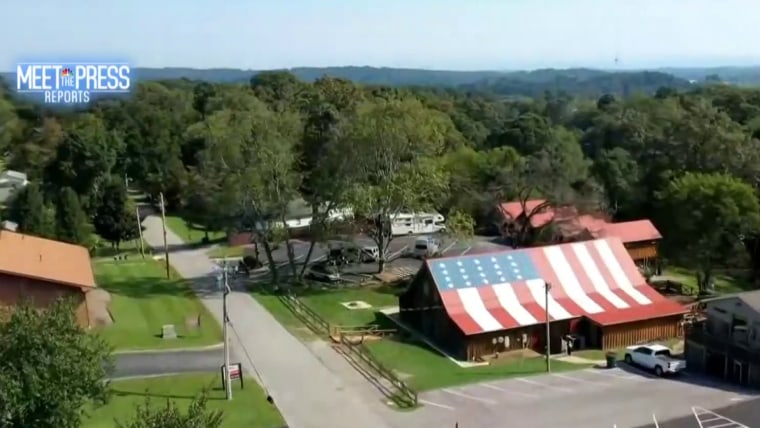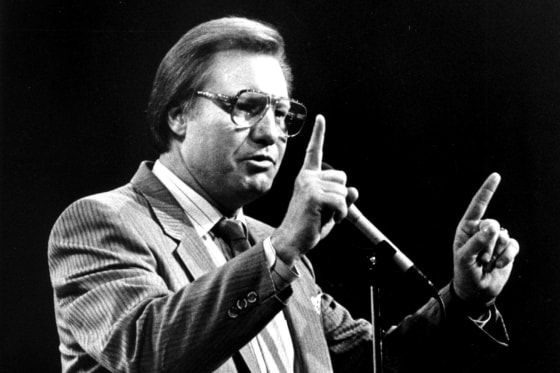Jimmy Swaggart, the prolific evangelist who died Tuesday at age 90, will be remembered in part for his tearful, snotty apology to his congregation in 1988 after he was linked to a prostitute. But Swaggart will be remembered not just for being an American evangelical leader who suffered a spectacular fall from grace. He will also be remembered for his fire and brimstone condemnations of LGBTQ people and people of other faith traditions that, in the 1970s and ‘80s, helped give rise to the religious right.
Swaggart was one of the pastors that President Ronald Reagan aligned himself with.
A prototype for the hard-line religious leaders that influence today’s Republican Party spouting hatred in the guise of Christian piety, Swaggart was one of the pastors that President Ronald Reagan aligned himself with. That offended many of the people Swaggart had defamed, including Catholics. He didn’t consider Catholicism to be Christianity and in 1986 he wrote a book saying as much.
His supporters might consider Swaggart’s legacy to include his Family Worship Center in Baton Rouge, Louisiana, and the worldwide television, print ministry and Bible college he created. But in my opinion, his most significant, and most troublesome, legacy includes end times conspiracies and the disdain he expressed in his Pentecostal fundamentalist preaching for Catholics, Jews and LGBTQ people.
Consider the album he released, called “What shall the end be: Is there really a curse on the Kennedy family?” Swaggart’s mix of old-time gospel, his interpretations of biblical prophecy and his evangelistic crusades spread a particular kind of fundamentalist Pentecostalism that endures today.

Born in 1934 and ordained in 1961 by the Assemblies of God, Swaggart became a prolific preacher and evangelist with a bombastic preaching persona, amassing a worldwide following through his television ministry and his evangelistic appearances. He was a catalyst for the growth of Pentecostalism in Latin America as well as Africa. At its peak, his ministry amassed over $100 million per year.
It would all crumble, in part because of Swaggart’s hypocrisy. After Swaggart publicly called out other evangelical leaders he accused of grievous sin, a pastor who said Swaggart falsely accused him provided photographic evidence of Swaggart with a prostitute. “I have sinned against you,” Swaggart said in a tearful apology as he confessed to his congregation. “I beg you to forgive me.”
It would all crumble, in part because of Swaggart’s hypocrisy.
That scandal was the beginning of a diminished ministry for Swaggart. The Assemblies of God ordered him to refrain from preaching for a year and to spend two years in rehabilitation. Swaggart, fearful of losing his ministry, came back to the pulpit sooner, and his denomination defrocked him. Also, he had to pay to settle with the pastor who said Swaggart falsely accused him. On top of that, in 1991, police in California pulled him over for traffic violations, and the woman in the car with him later identified herself as a prostitute he had picked up for sex .
Though Swaggart managed to hold onto his church, ministry and Bible school, by turning them over to his son Donnie Swaggart, he would never again reach the heights he did prior to his fall from prominence. Even though his own ministry deteriorated, it helped lay the foundation for the rise of prosperity gospel, megachurch ministries and the proliferation of religious broadcasting. His bombastic language and condemnation of others would diminish in influence as other ministries captured the spotlight in televangelism, but he will be remembered for that moment in time, when his face filled the television asking his congregation and God for forgiveness.
President Donald Trump posted on Truth Social that Swaggart was “our longest serving televangelist.” He may also have been the longest serving hypocrite, who seemed to have no problem trying to destroy other ministers’ lives as he was apparently living a double life himself. While the memory of his scandal may have faded, his preaching and evangelical crusades had a primary role in helping shape the sharp divisive religious environment that exists in America today.

